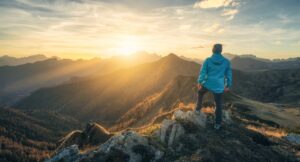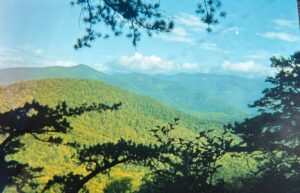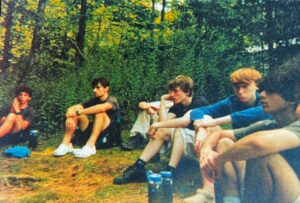September 10, 2024
Lessons Learned in Outward Bound
A veteran of sleepaway camp, Jacob Barash ’25 is no stranger to the wooded wilds. So, when he learned about the Perry S. Levy Outward Bound Scholarship, an endowed fund that provides an annual grant for a Kingswood Oxford student to attend an Outward Bound program, he knew this was an experience he wanted to embrace.”I like the outdoors,” Barash said, “but I’ve never done a backpacking trip. For my essay for the scholarship, I wrote about my interest in the outdoors and using the resources at hand. I wanted to take this to the next level.”

Barash ventured on the nine-day trip through the North Carolina Outward Bound School (NCOBS), an outfit that has delivered these challenging outdoor programs for 55 years. Led by two instructors, the trip encompassed backpacking and rock climbing through the temperate rainforests and wildflower fields of the Blue Ridge Mountains near Ashville with 12 intrepid campers.
On the first day, the group was dropped off in the middle of the woods with their 50 lb backpacks filled with clothes, equipment, a sleeping bag, and a tarp. Although Barash didn’t prep for the trip, he said the backpacks were well-designed so that the pack’s weight rests on your hips rather than your back and shoulders.
Each day, the campers would wake at 6:30 and eat a breakfast of oatmeal or grits cooked by the alternating crew of camper-chefs. The campers were given one bowl and one spoon for all their meals, and they washed their items with a little water with their fingers. Next, the campers set on their hike, which varied a few miles daily, using a map and a compass. On certain days, the hike involved rock climbing, where the instructor tied a rope with knots for the campers to make their ascent. During the nine days, there were a few thunderstorms, so the campers used their lightning drills. These drills involved the campers dispersing, rolling out their sleeping bags, and huddling in a ball to reduce the chance of getting struck by lightning.
When it was Barash’s turn to lead the campers, the group was headed back to the base camp, the longest hike of the trip. Since it was one of the last days, the instructor didn’t tell Barash which way to go, so he had to use a compass to determine the route with maps and typography. That day, one of the campers wasn’t physically capable of making the descent, so she had to backtrack to the nearest road and take the van so the rest of the team could go at their usual speed.
“As a leader, it was cool to set the pace and encourage one another,” Barash said. “Part of being a leader is recognizing if we need to slow down.”
One tremendous learning moment for Barash was interpersonal. Since the campers needed to operate as a cohesive team, one less physical camper slowed down the group on their treks. Barash said he learned to be patient and respectful despite his frustration. Another lesson was countering his hunger pangs. Although the campers were provided small rationed packed meals per day, they had to stagger their food intake.
Barash was familiar with life without a cell phone or internet due to his sleepaway camp experience. “It’s a great experience without a cell phone,” he said. “You forget about home and everything going on in the world. All your thoughts are focused on the next task, whether setting something up or cooking a meal.”
The lack of a cell phone allowed Barash to take in the fullness of nature. One day, the group was rock climbing on a natural rock slab. When the group reached the top, they could see over the trees for the first time. “The forest is so dense, and it finally opens up. You could see the rolling hills. It was a breathtaking moment. Nature really grounds me. No matter what is going on, the woods are always the same and peaceful.”
